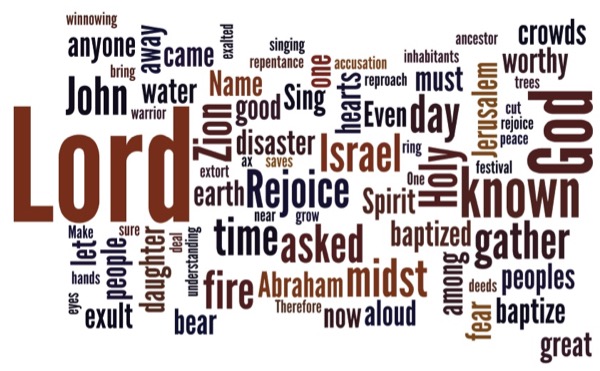3 Advent
Zephaniah poured out the venom of divine judgment against King Josiah’s multinational idolatries. Everyone was implicated. He thus roared until he, or his devout redactor, grew exhausted with the foul smell of wrath. Joy broke through. He said, speaking for God, “Sing aloud, O daughter Zion; shout, O Israel! Rejoice and exult with all your heart, O daughter Jerusalem! The Lord has taken away the judgments against you” (Zeph. 3:14-15). God is near and in the song. “The Lord, your God, is in your midst, a warrior who gives victory; he will rejoice over you with gladness, he will renew you in his love; he will exult over you with loud singing as on a day of festival” (Zeph. 3:17-18).
| Zeph. 3:14-20 • Cant. 9 Phil. 4:4-7 • Luke 3:7-18 |
A day of festival is anticipated right along with a day of wrath. Wrath is God’s truth in the face of human corruption, which, after it has blown, leaves a humanity adjusted to its providential place. “For I will leave in the midst of you a people humble and low. They shall seek refuge in the name of the Lord — the remnant of Israel …. Then they will pasture and lie down, and no one shall make them afraid” (Zeph. 3:12-13). It is good to be human again. It’s good to walk in a world not merely our own.
John the Baptist stands in the tradition of prophetic judgment. He called the gathering crowd a “brood of vipers.” His question is a thinly veiled threat: “Who warned you to flee from the wrath to come?” (Luke 3:7). He is speaking directly to their expectation, a narrative they well know. “That day will be a day of wrath, a day of distress and anguish, a day of ruin and devastation, a day of darkness and gloom, a day of cloud and thick darkness, a day of trumpet blast and battle cry against the fortified cities and against the lofty battlements” (Zeph. 1:15-16). John knows, as do the people, that a devout and holy life can only exist in the face of a sober meditation on the brevity of life and the certainty of divine judgment. Bear good fruit, share your extra coat, collect the amount prescribed, do not extort money. God is not mocked.
So the announcement “The Lord is near” sits uneasily alongside “Do not worry about anything” (Phil. 4:5-6). Yet the Lord has never been nearer than in the living flame of love (John of the Cross) blazing out in the person of Jesus Christ. Jesus said hard words too. People walked away, tried to entrap him, caught him, mocked him, and killed him. But for all the fire of his presence and the promise that he will come to judge, he is from before all beginnings and to the ages of ages, a pure divine person and the full substance of love. He is the truth, and the truth is never less than flame, never less than love.
Can this be said? Truth and mercy, God’s truth and mercy, have kissed each other. Caution is required. A ponderous tone and even a hint of threat will not sell in this time. The sermon is over when people stop listening. And yet, if gauged carefully, people will listen and receive the truth of their own need. They know they are not altogether good. Seeing this, they may see and feel the need for mercy.
In the face of mercy, what are we to say but this: “Sing aloud, O daughter of Zion; shout, O Israel! Rejoice and exult with all your heart, O daughter of Jerusalem!” (Zeph. 3:14).
Look It Up
Read Phil. 4:7. Mercy brings peace unimaginable.
Think About It
Truth and need make an empty flask ready for water from the springs of salvation.










